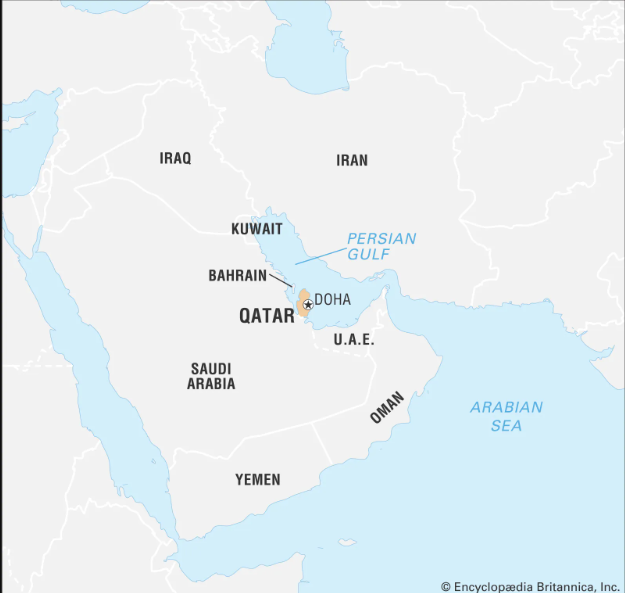ForumIAS announcing GS Foundation Program for UPSC CSE 2025-26 from 27th May. Click Here for more information.
Contents
| For 7PM Editorial Archives click HERE → |
Introduction
India-Qatar relations is facing a diplomatic stress test after Qatar awarded death sentence to eight retired Indian Naval personnel on espionage charges.
A brief snippet of the Espionage Case
| Timeline of the Case | August 2022- Eight Indian Naval personnel were arrested by the Qatari Authorities on charges of espionage of Qatar’s submarine program for Israel. September 2022- First bail plea was rejected. March 2023- First trial was held. June 2023- Second trial was held. October 1, 2023- India was granted consular access and Indian Ambassador met the prisoners in person. October 26, 2023- The eight Indian Navy personnel were handed the death penalty by a local court. |
| India’s Options for securing the release of personnels | 1. Invoking the agreement ‘Transfer of Sentenced Persons‘- India and Qatar signed the agreement in March 2015. Under this agreement, Indian prisoners convicted in Qatar can be brought to India to serve the remaining part of their sentence. 2. Leveraging the defence ties- India must leverage the strong defence ties with Qatar(Defence Cooperation Agreement) to secure relief for the personnels. 3. Legal Appeals- Pursue legal appeals through international courts like ICJ.(Kulbhushan Jadhav Case) 4. Deft Diplomacy- Resolve the case through ‘deft diplomacy’ involving the political intervention even at the level of Prime Minister (if needed). 5. Campaign Diplomacy- Building an international campaign to appeal for clemency. |
What is the history of India-Qatar diplomatic relations?

| 1971 | India was among the few countries which recognized Qatar soon after its independence in 1971. |
| 1973 | India and Qatar established full diplomatic relations in 1973. Year 2023, marks the 50 years of the bilateral diplomatic relations. |
| 2008 | Visit of PM Manmohan Singh to Qatar marked a significant turning point in India-Qatar Relations. |
| 2015 | The Emir of Sheikh Tamim Bin Hamad Al Thani visited India in 2015. |
| 2016 | PM Narendra Modi visited Qatar in 2016. |
What is the significance of India-Qatar Relations?
Political Significance- Qatar’s membership in Gulf Cooperation Council (GCC) is politically significant for India, especially concerning issues like Kashmir. Also, India needs support of Qatar for UNSC permanent membership.
Energy Security- Qatar is the largest supplier of LNG to India. LNG makes up almost 50% of our LNG imports.
Strong economic and trade ties- India is among the top four largest export destinations for Qatar (Qatar exports to India- LNG, LPG, chemicals and petrochemicals, fertilisers, plastics). India is also among the top three sources of Qatar’s imports (India’s key exports to Qatar include cereals, copper articles, iron and steel articles, vegetables, fruits).
Strong Business Presence of Indian Companies- Several Indian Companies like L&T, Wipro, TCS and TechMahindra operate in Qatar.
Large Expatriate Community and Remittances- Around 8 lakh Indian expatriate community live and work in Qatar. The flow of remittances (around 750 million dollars) and safety of Indian expatriate community, makes Qatar vital for India’s interest.
Defence and strategic co-operation- India and Qatar have signed a Defence Cooperation Agreement for stronger defence cooperation . The maritime relations are further strengthened by Exercise Zair-Al-Bahr.
Vibrant Cultural Exchanges- Cultural events organised by community organizations affiliated to the Indian Cultural Centre (ICC). Qatar was a co-sponsor of India’s resolution for declaration of June 21 as International Yoga Day.
What are the Challenges in the India-Qatar Relations?
Death sentence to arrested Indian Navy Personnel- The secretive trial and the harsh punishment to Indian Navy personnel have sent shock waves in the expatriate Indian community.
Islamic Conservatism- Qatar’s condemnation of the remarks made by the Indian ruling party spokesperson about Prophet was the sharpest among all the West Asian nations.
Harbouring Terrorism- Qatar with its deep pockets has harboured the Taliban and is amongst the major backers of the Muslim Brotherhood.
Use of Soft-Power against India- The Qatar-financed Al-Jazeera channel has often run aggressive campaigns against India like the abrogation of Article 370 in 2019.
| Read More- On India-Qatar relations – Qatar Questions |
Conclusion
The conflict in West Asia has complicated New Delhi’s task of smoothly managing its relations with Qatar. India should carefully use every diplomatic channel to help its citizens in Qatar. India must effectively use its ‘West Asia’ policy to further its engagement with Qatar.
| Read More- The Indian Express Syllabus- GS Paper 2 International Relations — Bilateral, regional and global groupings and agreements involving India and/or affecting India’s interests. |



